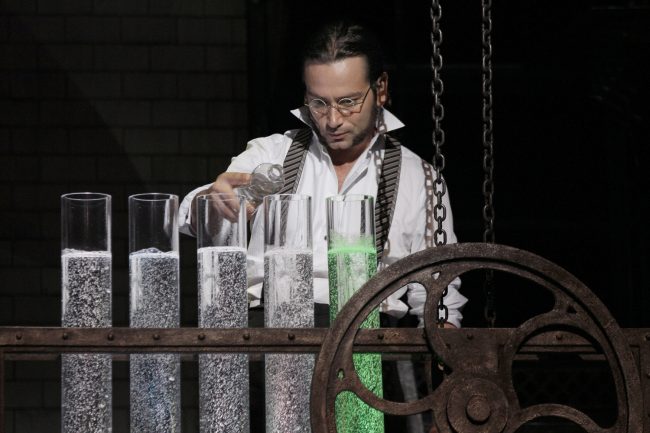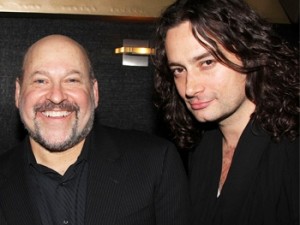
Jekyll and Hyde, the musical by Frank Wildhorn, December 2012
*
In his 1886 novella, The Strange Case of Dr. Jekyll and Mr. Hyde, Robert Louis Stevenson wrote the first vivid portrayal of the psychopathology of a “split personality.” His story exposed the dichotomy of the Victorian Era’s outward respectability and inward lust, and it made the phrase “Jekyll and Hyde” part of the language. But Stevenson failed to include a romantic plot or any motivating impulse for Dr. Jekyll’s obsession.
Now Jekyll and Hyde, the Musical, which opened on Broadway in 1997, has improved on its original source. The composer, Frank Wildhorn, and his team added an opening scene that shows Dr. Jekyll’s father strapped to a bed because he is criminally insane, motivating the son to find a way to cure such conditions.
Another addition is the board of Jekyll’s hospital, which rejects the doctor’s plan to experiment with a cure for such insanity, thus motivating the murders subsequently committed by Jekyll/Hyde.
The musical also develops romances with the highborn Emma and the slut Lucy (who was introduced in the 1941 non-musical film version). A concluding wedding scene and a bloody suicide are added as well.
By contrast, Stevenson’s book ends with Jekyll writing a letter saying that he is vanishing and only Hyde is left alive.
Clearly, much has been added, and it provides good theater. What’s more, Wildhorn wrote a tuneful score that calls for full-throated belting by two women and a half dozen men with big legitimate voices. Jekyll and Hyde may be one of the last of the classic Broadway musicals, a breed that’s been largely replaced by pop-rock presentations.
How many musicals today have so many hummable, memorable songs, like “Alive” and “Once Upon a Dream” (lyrics by Wildhorn’s original collaborator, Steve Cuden) and “This Is the Moment,” “A New Life,” “Someone Like You,” “Bring On the Men” and “In His Eyes” (lyrics by Leslie Bricusse)?
The show’s so-called “revisal” now on national tour includes some songs that were cut from the original Broadway production. It stars Constantine Maroulis, who got his start on  TV’s “American Idol” but earned legitimate vocal credentials at the Boston Conservatory of Music and on Broadway in Rock of Ages. Here he appears as a bespectacled nerdy doctor, then lets his hair down as he turns into the animalistic Hyde. In this dual role, he’s every bit as good as Broadway’s Robert Cuccioli and much better than David Haselhoff, who starred in the TV version. (Left: photo of composer Wildhorn with Maroulis)
TV’s “American Idol” but earned legitimate vocal credentials at the Boston Conservatory of Music and on Broadway in Rock of Ages. Here he appears as a bespectacled nerdy doctor, then lets his hair down as he turns into the animalistic Hyde. In this dual role, he’s every bit as good as Broadway’s Robert Cuccioli and much better than David Haselhoff, who starred in the TV version. (Left: photo of composer Wildhorn with Maroulis)
His co-star, the recording star Deborah Cox, surprised me by revealing a big legit voice with chesty low notes and a soaring top. She takes on the role originated by Wildhorn’s then-wife Linda Eder. While no one can match Eder’s Streisand-like high register, Cox sings stunningly and she exposes more of her body, which suits the character.
Teal Wicks, who played Elphaba in Wicked in New York, has a classic Broadway soprano voice that pairs well with Cox’s during their duet on “In His Eyes.” Jekyll’s lawyer, his fiancee’s father and the members of the hospital board are all well sung.
The new production, directed by Jeff Calhoun, conveys an appropriately industrial, sci-fi, dark edginess. The beakers filled with liquids undergo effective color changes, and visual projections highlight the conflict between the protagonist’s two sides.
The new musical arrangements are a cross between what’s needed in a big theater and the story-telling intimacy of the show’s recent concept album on the Broadway Records label with Maroulis, Cox and Wicks. That CD is worth hearing in conjunction with the stage version.